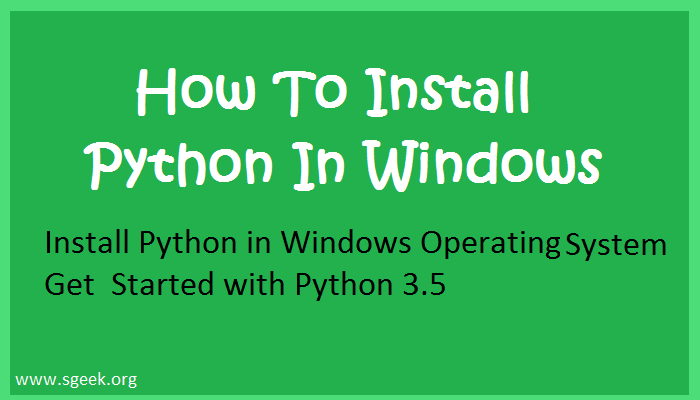How To Install Python in Windows
Python is high-level programming language created by Guido van Rossum in 1991. It is widely used in general purpose programming. It is using white space indentation to delimit code blocks instead of curly braces.
Python enables to programmers to write small as well as large scale clear programs. Unlike PHP python has a comprehensive standard library and large community which helps programmers to develop large scale programs. It is managed by the non-profit Software Foundation.

Python also supports object oriented programming, functional and procedural styles programming we well. It supports all the modern operating system including Windows, Linux, Mac and more. The latest version of python 3.5.3 is released in January 2017.
How To Install Python in Windows Operating System
Python required very small amount of space which is around 25 MB disc space without installation and 60 MB after installation.
In this Article We will learn how to install Python in Windows System. Python provides simple executable file to install.
Open official website of python and click on downloads. Clik on Windows x86-64 web-based installer for both the versions (32 Bits or 64 Bits Operating System)
Once Download completes, Double click on downloaded file labeling with python-3.5.3-amd64-webinstall.exe.
Click on Install Now and following below instructions.

During Installation it can slow the various running operations.

Finally Python Setup pop-up window will appear (Setup was successful).

Click on “Documentation” to start learning python or click on “Online Tutorial” to downloaded online tutorials.
Python should be installed now. To verify the installation, Open command line by Start > Programs > Python; should be added in program list. Click on ‘Python 3.5’ to open Python Terminal.
Here are some command line command for python.
which python : Used to check which version of python you are using
python -h : Open Python Help
python -c
Used execute code directly from command line
Eg.
|
1
|
python -c 'print("My First Program!")'
|
Output:
|
1
|
My First Program!
|
Now It’s time to create first program. Python program stands with ‘.py’ extension. All the continuous lines with same number of spaces would form as a block.
Eg.
|
1
2
3
4
|
If vers == True:
print "If Part"
Else:
print "Else Part"
|
Read More:
Create Twitter Bot Using Python and Tweepy
sSwitch – JQuery Plugin For Sliding Toggle Switches
How To Create Simple JQuery plugin
How To Implement Infinite Scroll Using JQuery, Ajax and PHP
Integrate Google Prettify in Html Page
Verify Your Server Meets PayPal Payment Gateway Requirements

